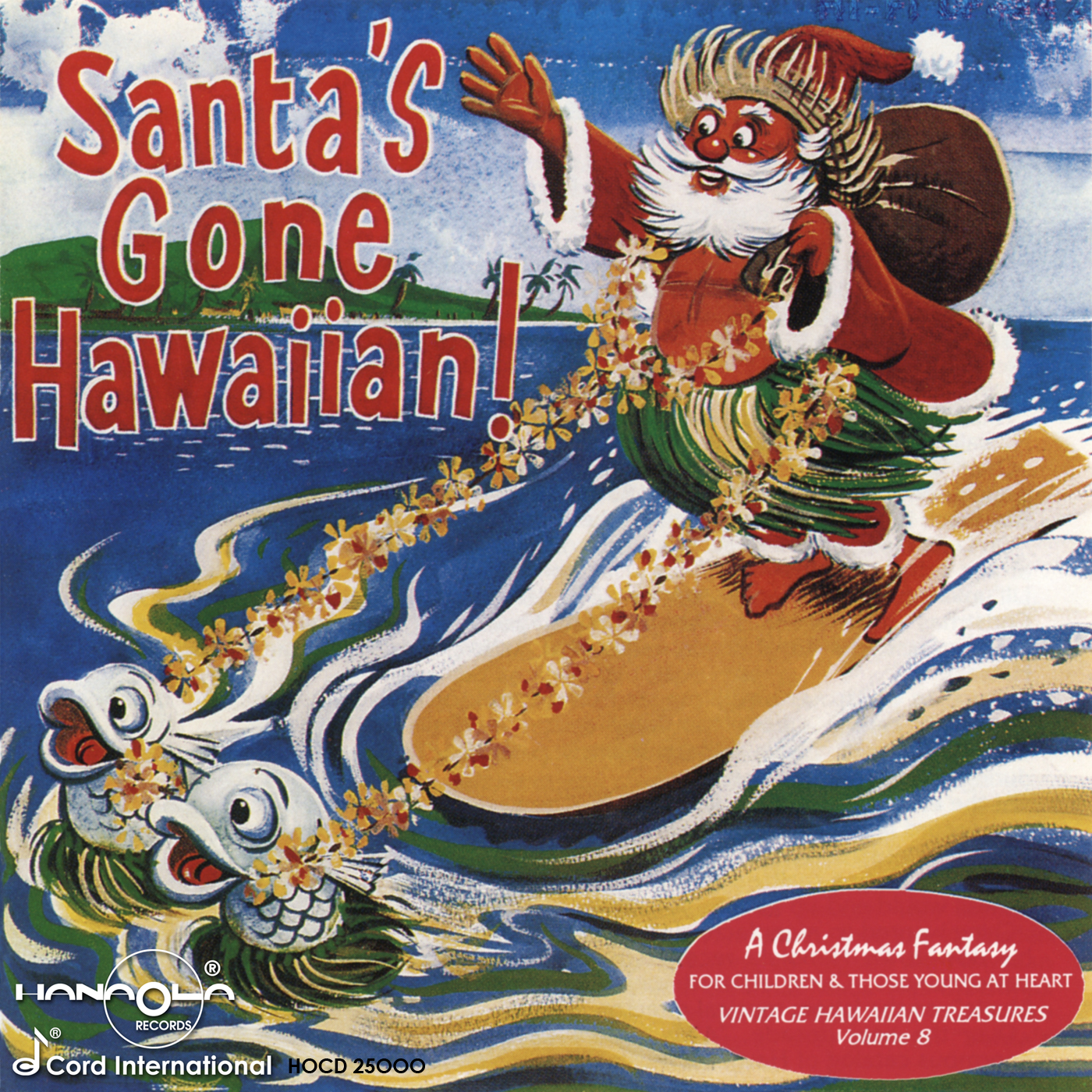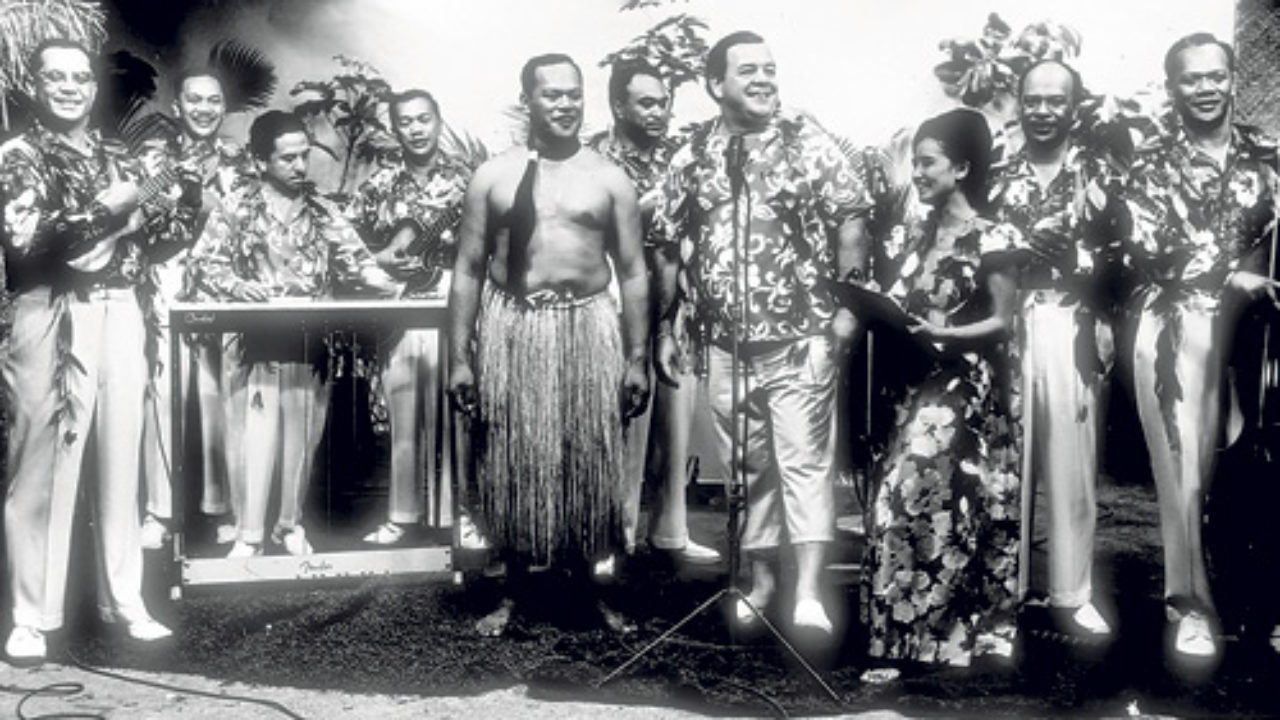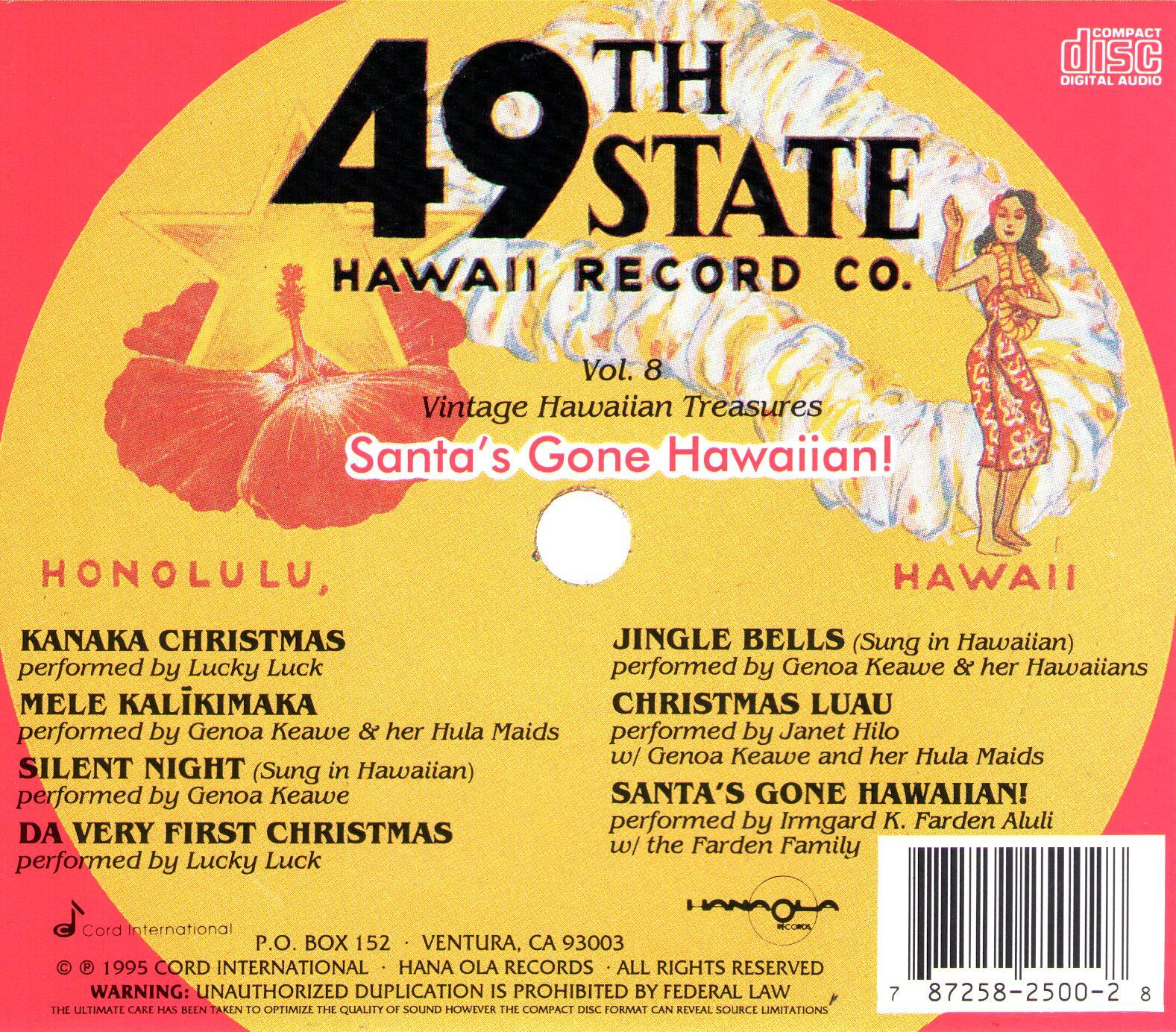

 |
 |
 |
| Download CD NOW | Listen on YouTube | Shipping to USA addresss ONLY |
| Hawaiian Language and Pidgin' English Post WWII Vintage Hawaiian Christmas Fun |
Santa's Gone Hawaiian is truly the finest vintage Hawaiian Christmas music ever released. And it's fun too! Lucky Luck will crack you up with his comical Pidgin' English dialect parodies, but watch out because he might just make you cry too when he tells you the touching story about "a keiki (child) in Betlahema (Bethlehem) who goin' be Alii (King) someday". Listen to a gleeful Hawaiian translation of Jingle Bells, the traditional Hawaiian favorite Christmas Luau, and a hauntingly beautiful Hawaiian language version of Silent Night. These are the songs and the stories that have been lovingly passed down through generations of Hawaiians, decade after decade, each Christmas season. A must-have one-of-a-kind classic. |
Entertaining Piece of Hawaiiana. This is the Christmas volume of the Cord International series of remastered vintage Hawaiian recordings from the 30s, 40s, and 50s. The three cuts by Genoa Keawe are wonderful Hapa Haole recordings -- pop Christmas songs of blended Hawaiian and mainland musical traditions and language. Janet Hilo does a quaint little sung story. The two cuts by Lucky Luck are Christmas stories told in slang [Pidgin' English] . The long item Santa Goes Hawaiian is a 15 minute story with pieces of song like Brian Wilson's Mt. Vernon and Fairway from the Holland album. It's a pleasant seasonal insight into Hawaiian culture told in a warm female voice. Kids at a certain age might love it. All in all, there is nothing slick about this CD; it's a sincere glimpse at Christmas in Hawaii. |
| Victor Edmunds |
Michael Cord and Harry B. Soria, Jr. continue the Vintage Hawaiian Treasures series with seven Christmas classics from the vaults of George K. Ching's 49th State Hawaii Records. Lucky Luck narrates a pidgin translation of "Twas The Night Before Christmas", Genoa Keawe sings R. Alex Anderson's "Mele Kalikimaka", and Irmgard Aluli and various members of the Farden family perform on the title track. Soria's extensive annotation includes translations of the Hawaiian lyrics for Keawe's recordings of "Silent Night" and "Jingle Bells". An excellent album in an excellent series, Santa's Gone Hawaiian: Vintage Hawaiian Treasures Vol. 8. |
| John Berger - Entertainment Editor: Honolulu Star-Bulletin, October 1996 |
In the two centuries since Hawaiians first received contact from the outside world, Christianity has flourished in Hawaii.Queen Ka'ahumanu was known as the favorite wife of Kamehameha the Great. She was given exceptional powers as the first Kuhina Nui, or Regent. After the death of Kamehameha the Great, Ka'ahumanu influenced the young Kamehameha II to lead the Hawaiian Kingdom in the abolition of the ancient gods and religious beliefs ('Ai Noa). It is a long and complicated story relating to kapu (an ancient Hawaiian code of conduct), taboo breaking, and the wielding of political power, but in short, Queen Ka'ahumanu cleared the way for the Protestant Christian missionaries from Boston who had arrived in Honolulu on April 19, 1820 to establish Christianity in Hawaii. The Protestant Christian missionaries were not the first in Hawaii to celebrate Christmas. The first exchange of Christmas gifts in Hawaii was held aboard the British ship Queen Charlotte on December 25th, 1786 where Captain George Dixon had her anchored at Waimea Bay, Kauai. The Christmas custom was quickly embraced by the people of Hawaii. In the Hawaiian language Merry Christmas becomes Mele Kalikimaka. Over the next fifty-two years many Americans became a part of Hawaii's population. On December 23, 1838, Stephen D. Mackintosh, the editor of the Sandwich Island Gazette, published the first Christmas message in Honolulu. On December 25, 1858, Mrs. John Dominis, Sr. gave the first grand Christmas party at her home, Washington Place. Her son would later marry Hawaii's last Queen, Lili'uokalani. On December 25, 1862, seventy-six years after those first Christmas gifts were exchanged on Kauai, King Kamehameha IV, Alexander Liholiho, issued a Royal Proclamation designating Christmas as an official holiday in Hawaii. Hawaiian Christmas music ranges from himeni, or Christian hymns, and traditional Christmas carols - both translated into the Hawaiian language - to hapa-haole Christmas songs. All have been lovingly passed on from generation to generation during each Christmas season. At the end of WWII, George K. Ching began recording Hawaiian music on his new record label 49th State Hawaii Records in the Territory of Hawaii. 49th State was so named because many businessmen were anticipating Hawaii's eventual attainment of statehood, however no one realized then that Alaska would actually gain that distinction and Hawaii would end up as the USA's 50th state August 21st, 1959. Ching wanted to manufacture Hawaiian records to answer the demand for music in his downtown Honolulu record store. To guarantee authenticity in the recording performances Ching enlisted John Kameaaloha Almeida known as the Dean of Hawaiian Music as the label's musical director. Over the next decade, 49th State Hawaii Records recorded and released an enormous catalog of Hawaiian musical expression. Traditional Hawaiian chant and hula, hapa-haole songs, and even music from the rest of Polynesia were recorded by a stable of aspiring local talent all under the guiding hand of John K. Almeida. The first 49th State recordings were made using an acetate record cutting machine in a make-shift studio at Ching's own home. When the technology became available, a tape recorder was used recording first on paper tapes and then later on plastic. The original recordings were released first on 78 rpm records. ©Cord International 1995 |

Robert Melvin Lucky Luck (1918 - 1977) was born in Waco, Texas the son of traveling carnival owner, juggler, and professional wrestler Roughhouse Nelson Luck. By the time Lucky was fifteen he'd traveled through every state in the Union his family settling in St. Louis, Missouri. He started his broadcasting career in 1940 when on a lark he bluffed his way into a job as a radio sports announcer for WPAD in Paducah, Kentucky by imitating what he thought a sports announcer should sound like. He was working at the station when word came through that Pearl Harbor, Hawaii had been bombed so he joined the Marines as a lieutenant stationed in Samoa. Lucky quickly became so proficient in Samoan that he was made a language interpreter in Pago Pago. His Polynesian language skills continued to blossom upon his arrival in Hawaii as WWII ended. He went on to became a cherished Hawaii personality with his natural ability to impeccably mimic any type of dialect. In 1949 he became the first Hawaii disc jockey to speak Pidgin English over the air. It was quite controversial at the time but his happy-go-lucky personality won over the listeners. Most believed he was part Hawaiian, or at least a local born kama'aina. Luck worked with Genoa Keawe for seven years on his show Lucky's Luau. Lucky Luck entertained Hawaiian residents through the 1970s as comedian, disc-jockey, television host, actor, and entertainer. |

Santa's Gone Hawaiian! - Vintage Hawaiian Treasures, Vol. 8
Lucky Luck, Genoa Keawe, Janet Hilo, Irmgard K. Farden Aluli - HOCD25000
